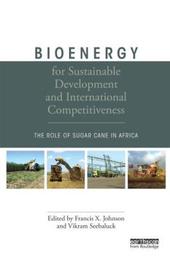
|
Bioenergy for Sustainable Development and International Competitiveness: The Role of Sugar Cane in Africa
Hardback
Main Details
| Title |
Bioenergy for Sustainable Development and International Competitiveness: The Role of Sugar Cane in Africa
|
| Authors and Contributors |
Edited by Francis X. Johnson
|
|
Edited by Vikram Seebaluck
|
| Physical Properties |
| Format:Hardback | | Pages:472 | | Dimensions(mm): Height 234,Width 156 |
|
| Category/Genre | Development economics
Agronomy and crop production |
|---|
| ISBN/Barcode |
9781849711036
|
| Classifications | Dewey:333.9539 |
|---|
| Audience | | Postgraduate, Research & Scholarly | |
|---|
| Illustrations |
33 black & white illustrations, 15 colour illustrations, 94 black & white tables, 5 colour illustrations, 33 black & white line drawings, 10 colour line drawings
|
|
Publishing Details |
| Publisher |
Taylor & Francis Ltd
|
| Imprint |
Earthscan Ltd
|
| Publication Date |
9 March 2012 |
| Publication Country |
United Kingdom
|
Description
Growing concerns about the impacts of climate change and dependence on fossil fuels have intensified interest in bioenergy from sugar cane and other crops, highlighting important links between energy, environment and development goals. Southern and Eastern Africa are characterized by severe poverty; the possibility to exploit a renewable energy resource offers valuable avenues for sustainable development and could support a more dynamic and competitive economy. This book describes how the bioenergy expansion will improve rural livelihoods, reduce costly energy imports, reduce GHG emissions, and offer new development paths. Drawing on international experience, particularly from Brazil and India, it is shown that harnessing this potential will require significant increases in investment, technology transfer, and international cooperation. Because of its high efficiency, the authors argue that sugar cane should be viewed as a global resource for sustainable development and should command much greater focus and concerted policy action. Through an analysis of the agronomy, land suitability and industrial processing of sugar cane and its co-products, along with an assessment of the energy, economic and environmental implications, this volume demonstrates that sugar cane offers a competitive and environmentally beneficial resource for Africa's economic development and energy security. With 44 authors representing 30 organisations in 16 countries, the book offers a truly international and interdisciplinary perspective by combining technical and economic principles with social, political and environmental assessment and policy analysis.
Author Biography
Francis X. Johnson is Senior Research Fellow in Energy and Climate at the Stockholm Environment Institute, Sweden. He was scientific coordinator of an EC-funded thematic research network on sugarcane in southern Africa and has served as evaluator, advisor or policy analyst for FAO, UNIDO, EUROSTAT, European Parliament Environment Committee and other international organizations. Vikram Seebaluck is lecturer and researcher at the University of Mauritius in the Department of Chemical and Environmental Engineering. His research areas include process systems analysis and energy efficiency in the sugarcane industry, bioenergy systems and co-products analysis, and energy for sustainable development.
Reviews"This book provides in-depth analysis of the role of bioenergy from various sources and from sugarcane in particular, which not only highlights the potential of these sources but also elaborates on policies and technologies for realizing it. This book would have great value for scientists, technologists, policy makers and the public at large, because on the basis of knowledge that it has assembled, societies would be able to develop a roadmap for an expanded future for bioenergy." - Dr. R.K. Pachauri, Director-General, TERI and Chairman of the Intergovernmental Panel on Climate Change (IPCC). "Bioenergy from sugarcane offers a valuable agro-industrial development opportunity for the many African countries that have suitable and available lands. They can expand a domestic resource and improve energy access while also contributing to energy security and climate change goals at national, regional and global levels. Through an interdisciplinary approach and a complementary mix of African and international experts and practitioners, this book provides useful guidance for policy makers, analysts and investors interested in developing this important renewable resource." - Kandeh K. Yumkella, Director-General of the United Nations Industrial Development Organization (UNIDO).
|